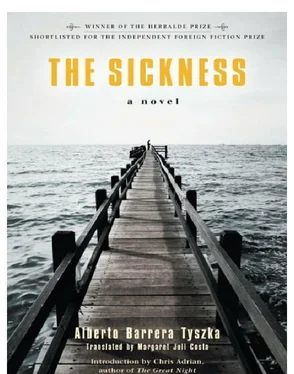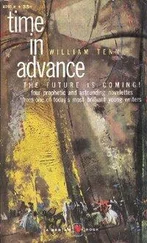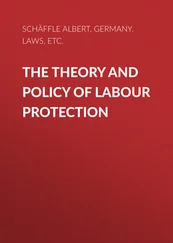“There’s no mistaking the signs. There’s no other way to read them,” says Andrés. “Or is there?”
Miguel turns toward him, tense, not sure what to answer. The waiter approaches and before he can say anything, Andrés cuts in with:
“He’ll have a vodka with ice and lemon. A double,” he tells him emphatically, deliberately, his eyes fixed on Miguel.
“I have to perform a fistula operation this afternoon,” Miguel says in answer to a question no one has asked, although he doesn’t sound very convinced.
“Just tell me what you think. There’s no hope, is there?”
Miguel doesn’t so much sigh as snort, before turning back to the X-rays. He again holds them up to the light, looking at them almost obliquely. The contrast between the blue and the opaque white reveals spots, dark irruptions, shadows that should not be there.
“It’s a spinocellular carcinoma, isn’t it?” Miguel asks, still scrutinizing the results of the scans.
“Stage IV,” says Andrés. Then he points to one of the CT images. “With cerebral metastasis,” he adds, his voice breaking.
“Whose X-rays are they?” Miguel asks rather fearfully, looking straight at him now.
“My dad’s,” says Andrés.
They sit staring at each other for a moment, not saying a word, wrapped in that rare complicity that comes with friendship.
“Shit!” is all Miguel can manage to say after that pause.
Andrés quickly talks him through the sequence of events: first, the fainting fit, then his own presentiment, the results of the blood tests, that presentiment again, the chest X-rays, and the CT scans. Miguel tries to get more details, to find other possible explanations.
“If he weren’t my father,” Andrés says, “you and I would have looked at the plates and concluded that there was no hope, that it’s the mother of all tumors, that the patient is basically screwed,” he adds, his voice choked with emotion. “There’s no need for a biopsy, there’s no point in opening him up.”
“Maybe, but. .” Miguel would like to say something, but there’s nothing to say. He can’t fool Andrés.
“Why do we find it so hard to accept that life is a matter of chance?” Andrés asks suddenly, a lump in his throat.
They both fall silent. Another whisky, another vodka. Miguel makes a phone call to cancel that afternoon’s operation. Andrés puts the X-rays and CT images back in their envelopes.
“And your dad, of course, knows nothing.”
“No.”
“You’re not going to be so stupid as to tell him, are you?”
“That’s what I always do, isn’t it? It’s what I’ve always said, the position I’ve always defended: the transparent relationship between doctor and patient.”
Another silence. Then Miguel tells him that he’s never agreed with that approach. Andrés nods, as if he hadn’t heard him, as if it were merely a mechanical, involuntary movement made while his mind is elsewhere. Perhaps he’s listening to his memory, watching all the sick people he’s treated and their families parade past; seeing all those who were going to die and for whom there was no hope. Perhaps he’s remembering how he put into practice his theory of transparency. Some people even found him hard and inhuman. Others thanked him. Andrés always preferred to share the clinical truth with the objects of that truth, with those weary bodies, transformed into medical material, the recipients of needles and chemicals. It had often fallen to him to say: “I’m sorry, there’s no hope. There’s not even any point trying somewhere else, going to Los Angeles or Houston. You have, at most, two months to live.”
He has always insisted that it’s best to be completely open with a patient. Even at the risk of inoculating him or her with a fear as terrible as the sickness itself. The likelihood is that the patient already suspects it, senses it, is secretly listening to the warnings coming from his or her own body, to the final note sounded by the sickness.
“We all have the right to know that our life has an end date, a deadline; we all have a right to know when and how we will die, that’s what I’ve always said.”
“But now it’s your father who’s on the other end of the stethoscope. It’s absurd, Andrés, think about it. You and I know how fast a cancer like this spreads.”
“And he’s never even smoked, damn it!” mutters Andrés. “Not a single bloody cigarette in all his life!” he exclaims, pressing his lips together, as if he had bitten on an ice cube.
“That’s what I mean. Don’t you think he’s going to say precisely the same thing and ask the same question? What point is there in him knowing the truth?”
“I can’t deceive him now. It wouldn’t be right.”
“I’m sorry, but that’s total bullshit.”
“No, it’s not. It’s part of our history, part of what we’ve been through together, as father and son.”
“The big question is: can you do it?” While he speaks, Miguel fidgets on his chair, leans forward, gives a certain confidential tone to his words. “I mean, it’s easier to say such things to a patient, to someone who isn’t a member of your family. It’s upsetting, but it’s not the same; it’s different having your father there before you, and having to say to him: ‘Dad, you’ve only got a few more weeks to live.’ That’s what I mean. Can you do that?”
“No, I can’t.”
Miguel nods, picks up his glass and takes another thoughtful sip before glancing first at his watch and then back at Andrés.
“Let me tell you about a case we had in the department recently,” he says at last.
Miguel is a nephrologist and, as well as having a private practice, he has worked for years as the director of a dialysis unit in a state-run hospital.
“There’s this one patient, he’s sixty-eight, a grumpy old thing called Efraín. He’s a diabetic, at least that’s his main ailment. He’s in the final stages, his kidneys are pretty much buggered, and he’s nearly blind. He has a terrible time on the dialysis machine. He screams and cries. He drives the technicians and the nurses mad. He’s become very bitter and fed up with life. Worse still: living for him equals suffering. He has to come into the unit three times a week and follow a ghastly diet, he finds walking very difficult and his life expectancy is reducing by the day, so you can imagine what his life is like. One afternoon, one of the nurses asked if she could speak to me alone. I was a bit puzzled by this at first, but we went into the office and sat down. Then she told me that Efraín wanted to die. I was really surprised. I thought perhaps she might be joking. Of course he must want to die, but the tone in which she said it implied something else. She said again that he wanted to die, that he was fed up with the whole business and tired of living like that. In principle, the procedure was simple: he just had to stop coming for dialysis. That’s all he needed to do. If, for one reason or another, he stayed at home, that would be that. His body wouldn’t be able to stand it, some organ would simply stop working and he would die. You could almost call it a natural death.”
Andrés nods silently. He signs to the waiter and asks for another whisky.
“That’s what the guy wants,” Miguel goes on. “He just wants the nightmare to end. So do his family. They’ve had enough, they’re as ill as he is. His illness has infected them, it’s killing them as well. They’ve spent years in the same hideous situation. You know what it’s like. The man can’t do anything for himself now, he’s half-blind, he stinks of bicarbonate from the machine, he has to take special medicines; they have to ferry him back and forth, keep an eye on his blood pressure, feed him, wash him. . Viewed coldly and objectively, for his family it would be a great relief, in every sense, if he were to die. And there’s another point too: if you consider the situation from an institutional point of view, from the point of view of providing a public service, it would suit society as well if old Efraín were to die. You and I have discussed this kind of thing before. He’s nearly seventy and, given his age and state of health, he has no chance of being selected for a kidney transplant. But he’s taking up a place, a turn, on a dialysis machine. At the time, there was a seventeen-year-old girl on the list, waiting for a chance to start treatment at the unit. Wouldn’t it be fairer for that girl to be there, rather than Efraín? I know that someone else, hearing this same story, might think it was tantamount to sanctioning homicide or murder or assisted suicide. But at the time, we all thought that Efraín’s death could be a blow for justice as far as the girl and her family were concerned, and for Efraín as well. As you yourself said: he already knew what his end date, his deadline was. All he wanted was to exercise his right to hasten that moment and not to continue this painful, long-drawn-out death. I talked to a priest about all this once. He, of course, gave me a sermon. I waited, and when he’d finished, I asked him: is masochism a sin? He was surprised, he hesitated, and then he said, yes, it was. Well, Efraín didn’t want to go on sinning. Living, for him, was a masochistic act. He simply wanted his death to be a gentle one, he wanted his death to put an end to the torment of his life.”
Читать дальше












